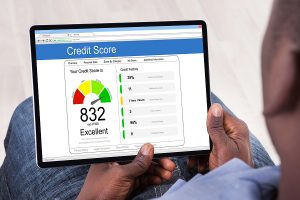Understanding and Improving Your Credit Score

You may be in the market to purchase a new car, apply for a credit card or even purchase a home but wondering how to pay for a significant expense over a period of time. When cash may not be an option, credit is the next best alternative.
Credit establishes your ability to borrow money with the understanding that you’ll pay it back at a later time. In today’s world, having good credit matters to help achieve your financial goals.
To consider your “creditworthiness” — in the most simple terms: your ability to repay, the first step creditors will take is a full review of your credit history. Credit history showcases an ongoing record of your borrowing and repayment of funds. This tells creditors how you use money and directly affects their decision to issue credit to you.
Understanding Credit Agencies and Credit Scores
Your credit history is summarized in credit reports which are collected by three major credit bureaus: Experian, Equifax, and TransUnion. Potential lenders utilize the information provided by these credit bureaus to run what’s called a credit check prior to making any decisions regarding an extension of credit.
Alongside your credit report is a calculated credit score also known as FICO. Credit scores are a significant indicator of just how risky a borrower you are. Your credit score can range anywhere from 300-850 with an average United States score of 711 within the “good” range.
When you go to apply for any type of credit — a car loan, student loan, home loan, or credit card, your credit score is used by the lender to determine how much they will lend you. The riskier you seem, the lower the limit they’ll give you.
Creditors set their own standards for what scores they’ll accept, but these are general guidelines:
- A score of 720 or higher is generally considered excellent credit.
- A score between 690 and 719 is considered good credit.
- Scores between 630 and 689 are fair credit.
- And scores of 629 or below are poor credit.
How To Fix Your Credit Score
Experian, Equifax, and TransUnion must make sure information reported is accurate required by federal law — The Fair Credit Reporting Act (FCRA) but you will want to regularly check your credit report to ensure the right information is there, too.
Now that you have an understanding of credit, you may be wondering how to improve your score. Try out these few tips below as a means to fix your score yourself.
Check Your Credit Report
Remember to not only fixate on your triple-digit credit score but the report the number comes from as well.
Your credit report has all your current debt information and payment histories. If you’ve missed payments or opened up a new credit account, this will also show up on your report. Since this is the information creditors use to decide whether to lend you money, staying up to date with your report ensures it is accurate prior to applying for credit.
When you review your credit report, it’s important to look for errors. That might look like creditors reporting missed payments (when you know you didn’t miss any) or debt amounts listed that don’t actually belong to you. If you do find errors, take the time to contact the creditor and dispute them correctly. The creditor’s information is listed on the report for ease of reference.
Pay On-Time
Your payment history plays a significant part in influencing your credit score. One of the best ways to fix your score on your own is to consider setting up auto-payments for outstanding balances.
Auto-payments simplify your life by being able to “set it and forget it”. You don’t have to worry about missing a due date and it enables the added security of knowing you won’t miss any future payments.
Even making just the minimum monthly payment on auto-pay will help build a good history of on-time payments. Making more than the minimum monthly payment (if you can) is a bonus as you’ll save yourself money in the long run.
Apply for a Credit Card
Do your research to find a credit card that fits your needs. If you’re just starting out building credit, it may be tempting to get more than one card — choosing one that ticks most of your boxes for borrowing credit in the first place should be the go-to decision.
Making on-time payments and familiarizing yourself with your personal spending habits is good practice when taking on any type of credit but especially with a credit card. Keeping your credit card balances under 30% of your spending limit (if not lower) is a great practice to incorporate whether you’re new or old to credit card knowledge.
Start Fixing or Improving Your Credit Score With A Credit Card From Partners Financial FCU
Partners Financial Federal Credit Union offers a variety of credit card options and advises its members about the benefits and features of each card. Click below to learn more tips to improve your credit with a credit card.

 Member Resources
Member Resources News & Information
News & Information Privacy Policy
Privacy Policy Fees
Fees Branch Holiday Schedule
Branch Holiday Schedule
